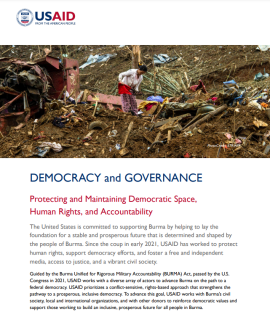The United States is committed to supporting Burma by helping to lay the foundation for a stable and prosperous future that is determined and shaped by the people of Burma. Since the coup in early 2021, USAID has worked to protect human rights, support democracy efforts, and foster a free and independent media, access to justice, and a vibrant civil society.
Guided by the Burma Unified for Rigorous Military Accountability (BURMA) Act, passed by the U.S. Congress in 2021, USAID works with a diverse array of actors to advance Burma on the path to a federal democracy. USAID prioritizes a conflict-sensitive, rights-based approach that strengthens the pathway to a prosperous, inclusive democracy. To advance this goal, USAID works with Burma’s civil society, local and international organizations, and with other donors to reinforce democratic values and support those working to build an inclusive, prosperous future for all people in Burma.
Support a Free and Independent Media
An informed and engaged public is a cornerstone of democracy. Independent print, broadcast, and online media are all restricted in Burma, creating information gaps—especially in marginalized and underserved communities. USAID works with journalists and media outlets to improve access to reliable information by supporting independent media organizations and helping them to engage their audiences on issues of public concern. Our programs support emerging media, especially in areas with significant ethnic minority populations, and deliver critical training to an expanding cadre of citizen journalists working to report on issues within their communities.
Strengthening the Rule of Law
In a democracy, laws enshrine the rights of citizens, protecting their safety and holding people, organizations, and government accountable for their actions. USAID supports local organizations, including civil society and community-based organizations to increase access to justice, promote human rights, and strengthen accountability. Our programs support alternative dispute resolution and counter trafficking in persons, combat corruption, and reduce vulnerability to human rights violations.
Human Rights
In 2021, Burma’s military deposed a duly elected government. The military regime has suppressed dissent and overturned democratic freedoms. Escalating armed conflict has further exacerbated concerns about human rights violations. As Burma’s human rights defenders, pro-democracy groups, and community leaders work tirelessly to respond to widespread human rights abuses and political repression, USAID is supporting efforts to protect and maintain civic space and participatory governance. USAID works with local partners to promote access to justice, defend human rights, and document human rights violations.
Civil Society
In the midst of an unstable and frequently shifting political environment, Burma’s civil society plays a vital role in delivering essential services, promoting civic engagement, and fostering more accountable governance structures. USAID supports civil society in its efforts to assist communities that are affected by or are prone to conflict, and bolster access to essential services, recover from conflict, and improve their resilience to future shocks. Our programming also helps build the capacity of civil society organizations to more fully participate in Burma’s democratic transition and play a constructive role in a future federal, democratic Burma.

AFP/STR

